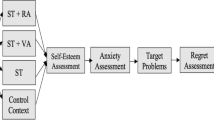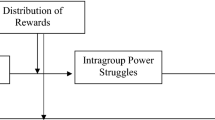Abstract
The purpose of the present research was to examine whether contextual cues related to control contribute to gender differences in math performance that emerge from patronizing behavior. Specifically, in two experiments, men and women received patronizing behavior (i.e., praise paired with a devalued position that did not provide an opportunity for monetary rewards) from a male leader in a stereotypically masculine domain. In this context, we manipulated contextual control cues and measured math performance. In Experiment 1, 113 undergraduates (60 women, 53 men) from a Midwestern University in the United States received the patronizing behavior and all position assignments were made either at the outset (no control) or multiple times (ambiguous control) from one patronizing leader. In Experiment 2, 132 undergraduates (53 women, 79 men) from a U.S. Midwestern University received patronizing behavior and position assignments were made by one leader (ambiguous control) or multiple leaders (enhanced control). Consistent with Hypothesis 1, women had lower performance expectations than men, but no reliable gender differences emerged for desire to succeed. Consistent with Hypothesis 2, gender differences in math performance only emerged in the ambiguous control conditions in Experiment 1 and Experiment 2 with men performing better than women. Finally, consistent with Hypothesis 3, women performed better in the enhanced control (vs. ambiguous control), despite receiving patronizing behavior. Implications for research on patronizing behavior, subtle sexism, and stereotype threat, as well as directions for future research are discussed.
Similar content being viewed by others
References
Barreto, M., & Ellemers, N. (2005). The burden of benevolent sexism: How it contributes to the maintenance of gender inequalities. European Journal of Social Psychology, 35, 633–642. doi:10.1002/ejsp.270.
Barreto, M., Ellemers, N., Piebinga, L., & Moya, M. (2010). How nice of us and how dumb of me: The effect of exposure to benevolent sexism on women’s task and relational self-descriptions. Sex Roles, 62, 532–544. doi:10.1007/s11199-009-9699-0.
Benokraitis, N. V., & Feagin, J. R. (1995). Modern sexism: Blatant, subtle, and covert discrimination. Upper Saddle River: Prentice Hall, Inc.
Biernat, M., & Vescio, T. K. (2002). She swings, she hits, she’s great, she’s benched: Implications of gender-based shifting standards for judgment and behavior. Personality and Social Psychology Bulletin, 28, 66–77. doi:10.1177/0146167202281006.
Biernat, M., Vescio, T. K., & Manis, M. (1998). Judging and behaving toward members of stereotyped groups: A shifting standards perspective. In C. Sedikides, J. Schopler, & C. Insko (Eds.), Intergroup cognition and intergroup behavior (pp. 151–176). Hillsdale: Erlbaum.
Bosson, J. K., Pinel, E. C., & Vandello, J. A. (2010). The emotional impact of ambivalent sexism: Forecasts versus real experiences. Sex Roles, 62, 520–531. doi:10.1007/s11199-009-9664-y.
Cadinu, M., Maass, A., Rosabianca, A., & Kiesner, J. (2005). Why do women underperform under stereotype threat? Evidence for the role of negative thinking. Psychological Science, 16, 572–578. doi:10.1111/j.0956-7976.2005.01577.x.
Campbell, S., & Collaer, M. L. (2009). Stereotype threat and gender differences in performance on a novel visuospatial task. Psychology of Women Quarterly, 33, 437–444. doi:10.1111/j.1471-6402.2009.01521.x.
Cheryan, S., Plaut, V. C., Davies, P., & Steele, C. M. (2009). Ambient belonging: How stereotypical environments impact gender participation in computer science. Journal of Personality and Social Psychology, 97, 1045–1060. doi:10.1037/a0016239.
Croizet, J., Després, G., Gauzins, M., Huguet, P., Leyens, J., & Méot, A. (2004). Stereotype threat undermines intellectual performance by triggering a disruptive mental load. Personality and Social Psychology Bulletin, 30, 721–731. doi:10.1177/0146167204263961.
Cuddy, A. J. C., Fiske, S. T., & Glick, P. (2007). The BIAS map: Behaviors from intergroup affect and stereotypes. Journal of Personality and Social Psychology, 92, 631–648. doi:10.1037/0022-3514.92.4.631.
Cuddy, A. J. C., Fiske, S. T., Kwan, V. S. Y., Glick, P., Demoulin, S., Leyens, J. Ph., Bond, M. H., et al. (2009). Stereotype Content Model across cultures: Universal similarities and some differences. British Journal of Social Psychology, 48, 1–33. doi:10.1037/0022-3514.92.4.631.
Dardenne, B., Dumont, M., & Bollier, T. (2007). Insidious dangers of benevolent sexism: Consequences for women’s performance. Journal of Personality and Social Psychology, 5, 764–779. doi:10.1037/0022-3514.93.5.764.
Dumont, M., Sarlet, M., & Dardenne, B. (2010). Be too kind to a woman, she’ll feel incompetent: Benevolent sexism shifts self-construal and autobiographical memories toward incompetence. Sex Roles, 62, 545–553. doi:10.1007/s11199-008-9582-4.
Fiske, S. T., Cuddy, A. J. C., Glick, P., & Xu, J. (2002). A model of (often mixed) stereotype content: Competence and warmth respectively follow from perceived status and competition. Journal of Personality and Social Psychology, 82, 878–902. doi:10.1037/0022-3514.82.6.878.
Gervais, S. J., & Vescio, T. K. (2007). The origins and consequences of subtle sexism. In A. M. Columbus (Ed.), Advances in psychology research (Vol. 49, pp. 137–166). Hauppauge, NY: Nova.
Gervais, S. J., Vescio, T. K., & Allen, J. (2011). When what you see is what you get: The consequences of the objectifying gaze for women and men. Psychology of Women Quarterly, 35, 1–13. doi:0.1177/0361684310386121.
Glick, P., & Fiske, S. T. (1996). The ambivalent sexism inventory: Differentiating hostile and benevolent sexism. Journal of Personality and Social Psychology, 70, 491–512. doi:10.1037/0022-3514.70.3.491.
Glick, P., & Fiske, S. T. (2001). An ambivalent alliance: Hostile and benevolent sexism as complementary justifications for gender inequality. American Psychologist, 56, 109–118. doi:10.1037/0003-066X.56.2.109.
Harmon-Jones, E., & Harmon-Jones, C. (2011). Social neuroscience of asymmetrical frontal cortical activity: Considering anger and approach motivation. In A. Todorov, S. T. Fiske, D. A. Prentice, A. Todorov, S. T. Fiske, & D. A. Prentice (Eds.), Social neuroscience: Toward understanding the underpinnings of the social mind (pp. 173–187). New York: Oxford University Press.
Harmon-Jones, E., Sigelman, J. D., Bohlig, A., & Harmon-Jones, C. (2003). Anger, coping, and frontal cortical activity: The effect of coping potential on anger-induced left frontal activity. Cognition & Emotion, 17, 1–24. doi:10.1080/02699930302278.
Harmon-Jones, C., Schmeichel, B. J., Mennitt, E., & Harmon-Jones, E. (2011). The expression of determination: Similarities between anger and approach-related positive affect. Journal of Personality and Social Psychology, 100, 172–181. doi:10.1037/a0020966.
Inman, M. L., & Baron, R. S. (1996). Influence of prototypes on perceptions of prejudice. Journal of Personality and Social Psychology, 70, 727–739. doi:10.1037/0022-3514.70.4.727.
Inzlicht, M., & Ben-Zeev, T. (2000). A threatening intellectual environment: Why females are susceptible to experiencing problem-solving deficits in the presence of males. Psychological Science, 11, 365–371. doi:10.1111/1467-9280.00272.
Jackman, M. R. (1994). The velvet glove: Paternalism and conflict in gender, class, and race relations. Berkeley: University of California Press.
Jost, J. T., & Kay, A. C. (2005). Exposure to benevolent sexism and complementary gender stereotypes: Consequences for specific and diffuse forms of system justification. Journal of Personality and Social Psychology, 88, 498–509. doi:10.1037/0022-3514.88.3.498.
Logel, C., Walton, G., Spencer, S., Iserman, E., von Hippel, W., & Bell, A. (2009). Interacting with sexist men triggers social identity threat among female engineers. Journal of Personality and Social Psychology, 96, 1089–1103. doi:10.1037/a0015703.
Meece, J. L., Parsons, J. E., Kaczala, C. M., & Goff, S. B. (1982). Sex differences in math achievement: Toward a model of academic choice. Psychological Bulletin, 91, 324–348. doi:10.1037/0033-2909.91.2.324.
Parsons, J. E., Kaczala, C. M., & Meece, J. L. (1982). Socialization of achievement attitudes and beliefs: Classroom influences. Child Development, 53, 322–339. doi:10.2307/1128974.
Ross, C. E., & Mirowsky, J. (1989). Explaining the social patterns of depression: Control and problem-solving or support and talking. Journal of Health and Social Behavior, 30, 206–219. doi:10.2307/2137014.
Ross, C. E., & Mirowsky, J. (1992). Households, employment, and the sense of control. Social Psychology Quarterly, 55, 217–235. doi:10.2307/2786793.
Ross, C. E., & Mirowsky, J. (2002). Family relationships, social support and subjective life expectancy. Journal of Health and Social Behavior, 43, 469–489. doi:10.2307/3090238.
Ross, C. E., & Mirowsky, J. (2003). Social structure and psychological functioning: Distress, perceived control, and trust. In J. Delamater & J. Delamater (Eds.), Handbook of social psychology (pp. 411–447). New York: Kluwer Academic/Plenum Publishers.
Rotter, J. B. (1966). Generalized expectancies for internal versus external control of reinforcement. Psychological Monographs: General & Applied, 80, 1–28. doi:10.1037/h0092976.
Rudman, L. A., & Heppen, J. B. (2003). Implicit romantic fantasies and women’s interest in personal power: A glass slipper effect? Personality and Social Psychology Bulletin, 29, 1357–1370. doi:10.1177/0146167203256906.
Ryckman, D. B., & Peckham, P. (1987). Gender differences in attributions for success and failure situations across subject areas. The Journal of Educational Research, 81, 120–125.
Schmader, T., Johns, M., & Forbes, C. (2008). An integrated process model of stereotype threat effects on performance. Psychological Review, 115, 336–356. doi:10.1037/0033-295X.115.2.336.
Shapiro, J. R., & Neuberg, S. L. (2007). From stereotype threat to stereotype threats: Implications of a multi-threat framework for causes, moderators, mediators, consequences, and interventions. Personality and Social Psychology Review, 11, 107–130. doi:10.1177/1088868306294790.
Spencer, S., Steele, C., & Quinn, D. (1999). Stereotype threat and women’s math performance stereotype threat, and performance expectancies: Their effects on women’s performance. Journal of Experimental Social Psychology, 35, 4–28. doi:10.1006/jesp.1998.1373.
Steele, C. M., & Aronson, J. (1995). Stereotype threat and the intellectual test performance of African Americans. Journal of Personality and Social Psychology, 69, 797–811. doi:10.1037/0022-3514.69.5.797.
Steele, C. M., Spencer, S. J., & Aronson, J. (2002). Contending with group image: The psychology of stereotype and social identity threat. In M. P. Zanna & M. P. Zanna (Eds.), Advances in experimental social psychology (pp. 379–440). San Diego: Academic.
Stipek, D. J. (1984). Sex differences in children’s attributions for success and failure on math and spelling tests. Sex Roles, 11, 969–981. doi:10.1007/BF00288127.
Swim, J. K., Aikin, K. J., Hall, W. S., & Hunter, B. A. (1995). Sexism and racism: Old-fashioned and modern prejudices. Journal of Personality and Social Psychology, 68, 199–214. doi:10.1037/0022-3514.68.2.199.
Tsui, M., Xu, X. Y., & Venator, E. (2011). Gender, stereotype threat and mathematics test scores. Journal of Social Sciences, 7, 538–549. doi:10.3844/jssp.2011.538.549.
Vescio, T. K., Gervais, S. J., Snyder, M., & Hoover, A. (2005). Power and the creation of patronizing environments: The stereotype-based behaviors of the powerful and their effects on female performance in masculine domains. Journal of Personality and Social Psychology, 88, 658–672. doi:10.1037/0022-3514.88.4.658.
Acknowledgement
This research was supported by the Clara Mayo Award from the Society for the Psychological Study of Social Issues (SPSSI) to the first author and a Pennsylvania State University research award from the Research and Graduate Studies Office (RGSO) to the second author.
Author information
Authors and Affiliations
Corresponding author
Rights and permissions
About this article
Cite this article
Gervais, S.J., Vescio, T.K. The Effect of Patronizing Behavior and Control on Men and Women’s Performance in Stereotypically Masculine Domains. Sex Roles 66, 479–491 (2012). https://doi.org/10.1007/s11199-011-0115-1
Published:
Issue Date:
DOI: https://doi.org/10.1007/s11199-011-0115-1




